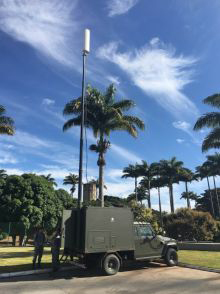 Motorola Solutions has been demonstrating the use of LTE to provide applications, high-speed data and mission-critical communications in Brazil’s Federal District and São Paulo, using a special vehicle to temporarily create a dedicated LTE network.
Motorola Solutions has been demonstrating the use of LTE to provide applications, high-speed data and mission-critical communications in Brazil’s Federal District and São Paulo, using a special vehicle to temporarily create a dedicated LTE network.
The demonstration(s) focused on the potential benefits for airports, logistics operations and public safety and provided stakeholders with information on multi-media collaboration with real-time video, mapping, images, facial recognition and response teams, and about interoperability between mobile and fixed-line systems.
The “LTE bubble” or defined area of coverage around the vehicle, makes it possible to use applications such as Motorola Solution’s CommandCentral Streaming, which transmits buffer-less video to the command center and other personnel in real time, to enhance situational awareness. A facial recognition application was also demonstrated.
The demonstration series has already been held in Brasilia and will be held in São Paulo during the month of July.
Motorola Solutions' country manager, Elton Borgonovo, said when asked by TETRA Today about the Brazilian critical communications market said that his company sees "big opportunities in key vertical markets" such as transportation, logistics, agriculture, utilities and forestry for critical communications. Motorola Solutions is also targeting the country with its TETRA offerings.
It was recently asked by CMPC, a company in the Brazilian state of Rio Grande do Sul and one of the leaders in Latin America in the production and commercialisation of forestry products, paper and cellulose, to provide reliable communications between CMPC’s Brazilian subsidiary’s operations during emergencies, and connect communication systems in Brazil and Chile through a single, integrated TETRA network, as part of a managed services model.
Borgonovo added that the company is focused on several opportunities in the most important cities and in different markets to provide "solutions and services for critical communications in different public and private organisations in the key regions in Brazil".
"The big games – World Cup and Olympics – were key motivators of investments in public safety communications in the last years," added Borgonovo.
"Smart communications systems are really being used, and Brazil is on the cutting edge of dedicated public safety LTE. Together with traditional radio communications, a dedicated LTE network plays an important role both in the public and private sectors by providing a complete and collaborative vision among different devices and systems."
Sepura, one of Motorola Solutions' main competitors, was chosen in June this year to provide a TETRA network for use by the emergency services of Macapá, the capital of the state of Amapá.



